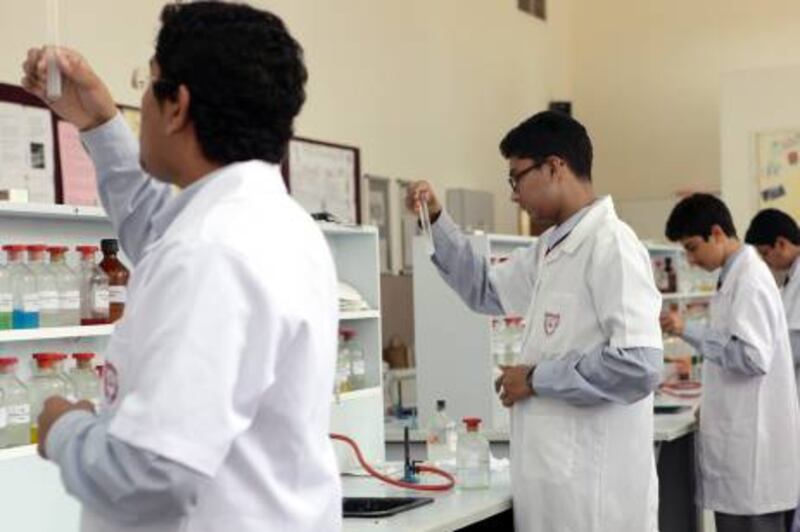DUBAI // An Indian school rated "unsatisfactory" by school inspectors for the second year in a row has announced it will close its doors in April.
The Al Majd Indian School in Dubai is winding up operations and will shut at the end of the academic year in April after failing to improve since the start of inspections by the Dubai Schools Inspection Bureau (DSIB) in 2009.
Rafiq Rahim, principal of the school, which follows the Kerala Board of Education, said the low fee structure had not allowed it to meet the expectations of the authority.
"A lack of facilities and a fee structure that is not sufficient to bring about any significant changes has hampered all our efforts to improve," said Mr Rahim.
The school was visited three times by inspectors between 2009 and last year, but it has remained plagued by glaring shortcomings.
According to a follow-up report released by DSIB yesterday, the school is poorly resourced and inadequately staffed. Most of the teacher-made resources were of poor quality. The library did not stock many books and science laboratories were missing necessary tools and equipment.
Learning resources were inadequate, which meant teachers relied heavily on textbooks.
A poor quality of teaching coupled with a lack of suitably qualified staff was affecting student performance and restricted the development of their analytical skills, said the report.
Mr Rahim said the school required a major change, which was possible only through a complete management overhaul.
"We are now in the process of transferring to new management, which will restructure the entire school," he said.
In place of Al Majd, the new management will build another school with a better infrastructure to offer the Indian Certificate of Secondary Education curriculum.
"We have already received the go-ahead from the KHDA for this and we hope to operate as a newly registered schools by 2012," said Mr Rahim.
More than 1,000 students are enrolled in kindergarten to Grade 10 classes at the school. Parents have been told of the closure and they will be assisted in finding admissions at alternative schools following Indian curricula.
Walid Moosa, a father of three children who study at Al Majd, said he was disappointed when he was told about the closure and is now "running from pillar to post" to find a school within his budget.
"I am a middle-class parent and no businessman," said Mr Moosa who pays between Dh6,000 and Dh9,000 in fees for each his children who are in kindergarten, Grade 6 and Grade 10.
"The five-figure salary I get goes toward my children's education, housing, water and electricity and loans," he said. "So I can only afford schools like Al Majd."
Mr Moosa said he disagreed with the inspection report and believed the teachers put in their best to provide good education at the school.
Dr Mohammed Aslam Khan, the principal of New Indian Model School (NIMS) in Dubai, said he hoped to be able to accommodate 15 to 20 per cent of the Al Majd student body. "I'm aware the school is closing, so we've agreed to give priority to these students during the enrolment stage."
Many parents in Mr Moosa's situation say options for affordable education are sliming in the emirate.
Another father, V Moosa, whose children study at the NIMS, said schools catering to the middle class must be inspected keeping their limitations in mind.
"As a parent who has been associated with the school for more than 10 years, I have seen a lot of improvement," he said about the school that has maintained its "acceptable" rank but is doing well to provide safety and security and Islamic education to students.
"However, for many changes the authority expects, schools will obviously require more funds and these schools will have to ultimately raise the fees for it."
Mr Walid Moosa said the government should help such private schools that are genuinely trying to make education accessible to everyone.
[ aahmed@thenational.ae ]






